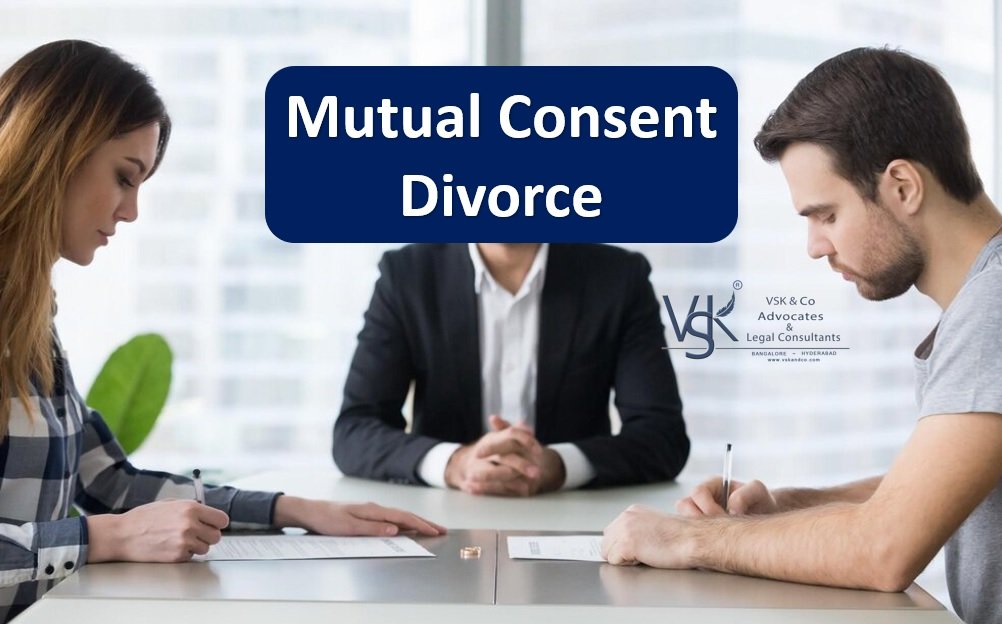Get MUTUAL CONSENT DIVORCE
MUTUAL CONSENT DIVORCE
MUTUAL CONSENT DIVORCE / Mutual Divorce is when both a couple commonly concur that they can’t live respectively any longer and that the best arrangement being Divorce, they would introduce a Mutual Divorce request together under the watchful eye of the decent court, without advancing any claims against one another.
“A happy marriage is a harbor in the tempest of life; an unhappy marriage is a tempest in the harbor of life.” What preserves and sustains marriage is not the fact that legally it subsists or whether morally the couple is impelled to continue in it. It is the reality and the sincerity with which the bond is kept intact. With the spread of education, consciousness, the emancipation of women, economic independence and breakdown of the joint family system, uncontrollable marriage bonds are becoming unstable.
Obtaining a divorce, based on the matrimonial ground specified under the law is not only very time consuming and nerve breaking. All sorts of allegations are cooked up, to bring the case within the pigeonhole of the ground. And if after the long-drawn battle, the evidence falls short of proving the matrimonial offence the petitioner is denied relief.
REQUIREMENTS FOR MUTUAL DIVORCE / MUTUAL CONSENT DIVORCE
The main requirements which have to be satisfied before a petition for divorce by mutual consent can be made are:
- At first, the petition for divorce is presented before the Family Court;
- The said petition must be presented jointly, by both the parties to marriage whether such a marriage was solemnized before or after the commencement of the Marriage Laws (Amendment) Act, 1976;
- The parties have been living separately for at least one year. The idea behind this requirement is, they have lived separately for so long that there is a presumption they are not interested to continue the relationship.
- The parties are not able to live together with the spouse.
- The parties have mutually agreed, to dissolve the marriage.

Documents Required to Register for The Mutual Divorce
Following list of documents required to file a Mutual Divorce
1) Address Proof of Both Parties
2) Professional and income details of both
3) Marriage Certificate
4) Proof of living separately (more than six months or a year)
5) Proofs indicating disappointed attempts for adjustment
6) Income statements
7) Property and Assets details of owned by the couple
JUDGEMENT ON THE SCOPE OF SECTION 13B OF HINDU MARRIAGE ACT, 1955.
In the judgment of, Jayashree v. Rameslh A.I.R. 1984 Bom. 30. This case gave rise to certain issues and queries as regards the application and interpretation of section 13B.
In Jayashree v. Rameslh A.I.R. 1984 Bom. 30, a wife filed a divorce petition or, in the alternative, for judicial separation on various grounds. Later, this was withdrawn and on the same day, a joint petition for divorce by mutual consent under section 13B was filed. The parties stated in the petition (as is mandatory under the provision) that they have been living separately and it’s impossible for them to live together. Both of them mutually agreed that the marriage must be dissolved. During the transitional period, that is, after six months and before 18 months, the husband changed his mind and made an application to the district court saying that he did not want to divorce his wife. He argued that he was very indecisive at the time of the joint application and realized thereafter that they could live together amicably. The wife, however, was firm in her earlier stand and still wanted a divorce. The district court under these circumstances refused to dissolve the marriage.
The wife appealed to the High Court. The main issue was whether a party to a joint divorce petition could withdraw his or her consent to the divorce. After consideration of the provisions of section 13B and order XXIII of the Code of Civil Procedure 1908, the court came to the conclusion that such a petition could not be withdrawn without the consent of both parties. In this case, since the wife who was a party to the joint petition, had given her consent to the withdrawal or abandonment of the petition, the same was proceeded with. The court held that the crucial time for the consent of divorce under the section was the time when the petition was filed. If the consent was free and not vitiated, no party could nullify the petition by withdrawing the consent. Given this, divorce by mutual consent was decreed.
PROVISION FOR MUTUAL CONSENT DIVORCE:
Section 13-B of the Hindu Marriage Act, 1955 (HMA) states as under:
“13-B. Divorce by mutual consent.-
(1) Subject to the provisions of this Act a petition for dissolution of marriage by a decree of divorce may be presented to the District court by both the parties to a marriage together, whether such marriage was solemnized before or after the commencement of the Marriage Laws (Amendment) Act, 1976, on the ground that they have been living separately for a period of one year or more, that they have not been able to live together and that they have mutually agreed that the marriage should be dissolved.
(2) On the motion of both the parties made not earlier than six months after the date of the presentation of the petition referred to in sub-section (1) and not later than eighteen months after the said date, if the petition is not withdrawn in the meantime, the court shall, on being satisfied, after hearing the parties and after making such inquiry as it thinks fit, that a marriage has been solemnized and that the averments in the petition re true, pass a decree of divorce declaring the marriage to be dissolve effect from the date of the decree.”
IMPORTANCE OF A DIVORCE LAWYER TO SEEK DIVORCE:
Approaching a lawyer in divorce proceedings is mandatory. As the lawyer, provides you legal help in the matters of property, your relationship, amount of alimony, and your child custody which cannot be handled by you alone. And if both spouses are clear headed and have resolved most of their issues, the process is straightforward and cost efficient.
Mutual Divorce Process
Firstly, the lawyer advices you to complete and sign your required documents like address proof of spouses, marriage certificate if you have, family details, property assets owned by parties, evidence of living separately more than a year, and evidence of not getting reconciliation or reunion.
Secondly, the Custody of a Child is either given to his mother or father. If one parent gets custody than visitation rights are provided to another spouse. The custody of a child is governed by The Hindu Minority and Guardianship Act, 1956. The court sees that better financial resources or love are one of the factors but are not the sole determining factors in the custody of a child. According to Section 26, the court may pass an interim order from time to time as they find just and fair for a child concerning his custody, maintenance, and wishes. Essential thing is, to ensure the child’s future is protected.
Thirdly, consultation on the property dispute matters owned by you and your spouse jointly or separately. Both the spouses can make the will of their property or alter it, so that no future dispute arises. A woman cannot claim right in the husband’s ancestral property but she can if they have joint property or if a property is purchased in the name of a woman. Whereas, children have right in the property of both.
Fourthly, Alimony in simple terms means maintenance or support. It is a pecuniary compensation given by one spouse to another after getting a divorce to balance the livelihood of that spouse whose earning is low or none. It is generally provided after divorce because immediate financial support by own is not possible. The alimony is gender- neutral as it can be asked either by husband or wife.
(FOR END CONCLUSION ALONG WITH VSK INFO)
The women in the society have to face many consequences, harshness, injustice from her husband, and their family. Since independence, various laws for women were made to help them to get out of all the harsh reality by seeking a divorce from the court. And a good divorce lawyer will help you to safeguard your rights, split your assets, manage child custody, and also decide on appropriate alimony.
The person (She / He) in the society have to face many consequences, harshness, injustice from her / him, and their family. Since independence, various laws were made to help them to get out of all the harsh reality by seeking a divorce from the court. And a good divorce lawyer will help you to safeguard your rights, split your assets, manage child custody, and also decide on appropriate alimony. You can get best divorce lawyer for women or Divorce layer for men here in VSK & Co, we have a quit potential divorce lawyers to handle any kind of divorce matter and give a very accurate result. You can Consult our Mutual Divorce Lawyers in Bangalore and also reach our Mutual Divorce lawyers in Hyderabad.




